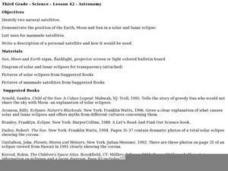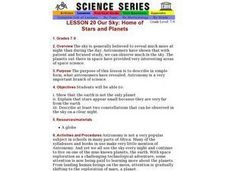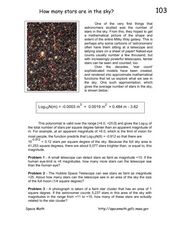Curated OER
Best of the Solar System
Students visit a site which provides images to be analyzed. Notes are taken and planets are named based on observed features and observations. Using peer review, they try to determine the identity of the planets. They are free to browse...
Curated OER
Day and Night
Students using experiments try to demonstrate how observations can be affected by the cycles of night and day.
Curated OER
Seeing The Sun In A New Light
Young scholars examine the observation of "coronal holes," by x-rays, also about related fast streams and moderate magnetic storms that recur at 27 day intervals. They study NASA'S great observatories.
Curated OER
Celebrating 100 Years of Flight
Students explore the history, science, and journey through flight. They use the Internet to access information in order to participate in active writing assignments. They conduct other activities and build their own virtual plane.
Curated OER
Measuring Elevation
Students practice measuring elevation, one of the key coordinates used by astronomers. They describe how the elevation of an object is measured.
and combine compass directions and elevation to find celestial objects.
Curated OER
The Universe
Fifth graders identify and discuss responsibilities of careers related to the study of the universe, such as an astronomer or an astronaut. They compare what the world looks like now to what it might look like in the year 3000.
Curated OER
Science - Lesson 42 - Astronomy
Third graders demonstrate the position of the Earth, Moon, and Sun in a solar and lunar eclipse. They list uses for manmade satellites and write a description of how a satellite would be use.
Curated OER
Our Sky: Home of Stars and Planets
Students discover that astronomy is a branch of science that includes the study of planets, stars, and constellations.
Curated OER
Exploring the Planets
Sixth graders explore the planets through an interactive web site. In this astronomy based lesson, 6th graders compare planets, explore comets, and discover planet facts through a variety of activities provided by the Smithsonian Museum.
Curated OER
Fractions, Decimals, and Gravity
Pupils discuss how weight is directly related to gravitational force on a planet. Students then choose Space Traveler as companion and compute how much their guide weighs on various planets, based on each planet's relative surface...
Curated OER
Sky Pictures
Students investigate constellations. In this space science instructional activity, students view transparencies of constellations and identify the zodiac constellations. Students research the legends connected with the constellations.
Curated OER
Heavens Above
Middle schoolers study the stars and their positions. In this astronomy lesson students see how scientists can predict the positions of the stars and can tell how they would have appeared in the past.
Curated OER
Earth, Moon, Mars Balloons
Students demonstrate size and orbits of Earth, Moon, and Mars. In this space science lesson plan, students will use balloons to show how the size and distance between the planets and satellite compare.
Curated OER
Variables and Expressions from Around the Cosmos
In this variables and expressions activity, students solve 7 problems using different mathematical formulae to find the length of Earth's day in the future, the distance to the galaxy Andromeda, the temperature of a gas cloud emitting...
Curated OER
Solar Systems Models Foldable Question Sheet
For this solar system worksheet, students use foldable models they made of the planets to answer questions about each planet. They answer questions about the theories and predictions made in our history about the solar system and answer...
Curated OER
Starlight, Star Heat
In this stars worksheet, learners read how astronomers calculate the temperature of a star by measuring its color. Students use a chart showing star temperatures and colors to complete 3 short answer questions.
Curated OER
How Many Stars are in the Sky?
For this star count worksheet, students solve three problems using a given polynomial and its logarithm to determine the number of stars in a given area.
Curated OER
Our Solar System to Scale
Middle schoolers calculate the diameter of planets and their relative distances. In this space science lesson, students discover how small or big the planets are in comparison to each other. Middle schoolers use cross multiplying...
Space Awareness
The Intertropical Convergence Zone
Young scientists know it is hotter along the equator, but why is it also rainier? Through the process of completing two experiments and a worksheet, scholars discover the answer is the intertropical convergence zone. First, they...
Curated OER
Types of Scientists
In this science worksheet, students match each type of scientist listed in the left-had column to its correct description found in the right-hand column. There are 34 different scientists to match on the sheet.
Curated OER
The Solar System
In this solar system instructional activity, students complete a word puzzle by determining the terms associated with the 10 statements about the planets.
Curated OER
Constellation Projections
Students draw constellations. In this astronomy instructional activity, students create constellations from star groupings projected on a chalk board. Students connect the "stars" to create a pattern on the board. Student can create new...
Curated OER
The Planets Moon
Students explore the theories of the creation of the universe and examine the properties of celestial bodies. They analyze the relationship between the sun, Earth and other planets. They discover the infinite potential of the science of...
Curated OER
Project SETI.
Tenth graders study how to search for life in outer space and make use of the 40-foot radio telescope at Greenbank, West Virginia. Request that the telescope be pointed at a particular location and time and receive data back from it...
Other popular searches
- Astronomy and Space Science
- Space Science Astronomy
- Space and Astronomy
- Preschool Astronomy/space
- "Astronomy and Space Science
- Astronomy and Space Lesson

























